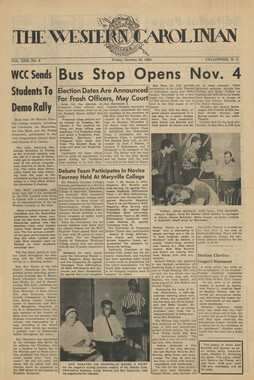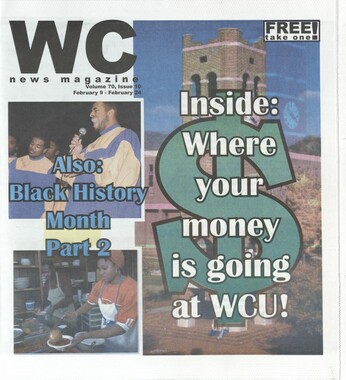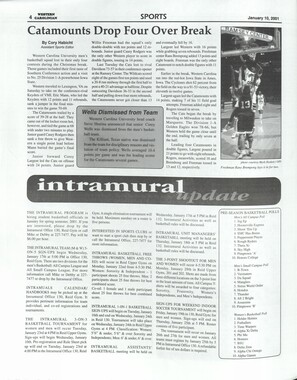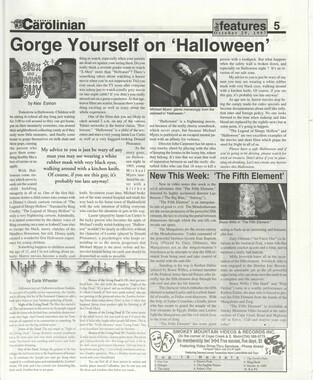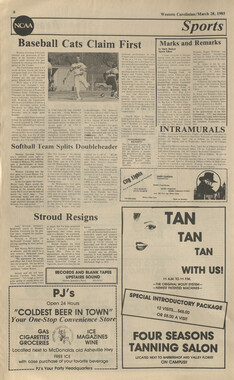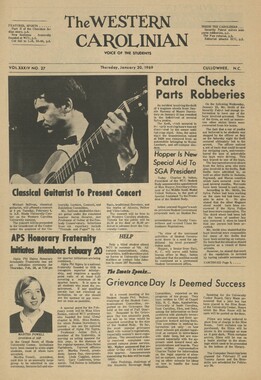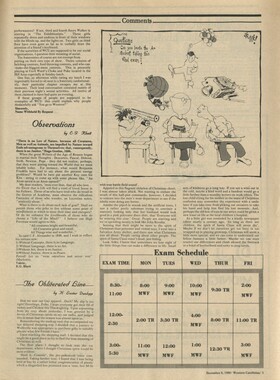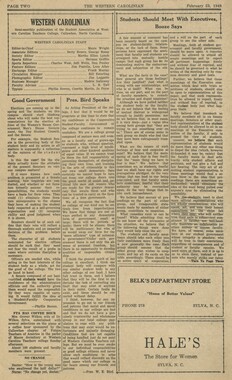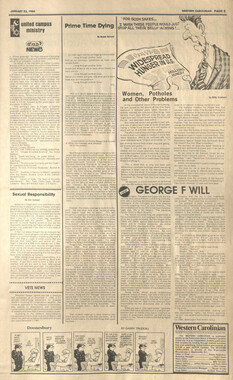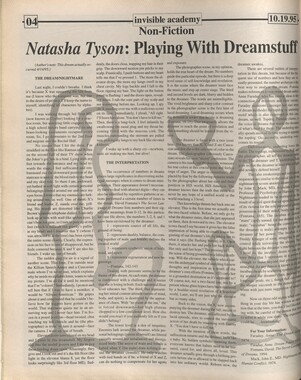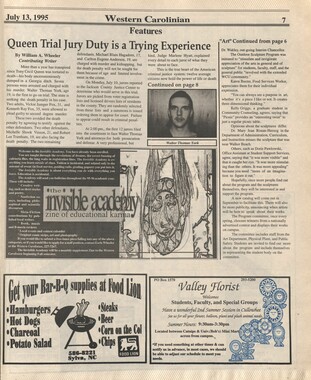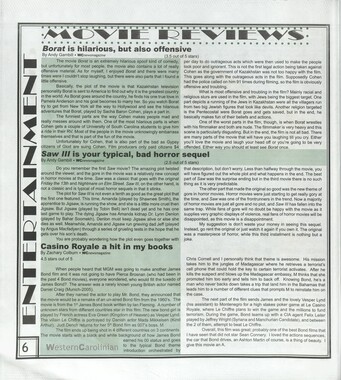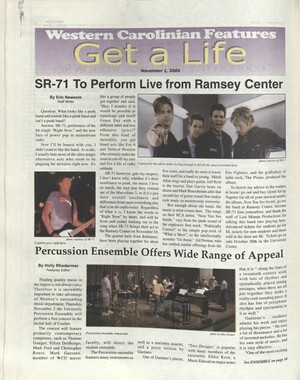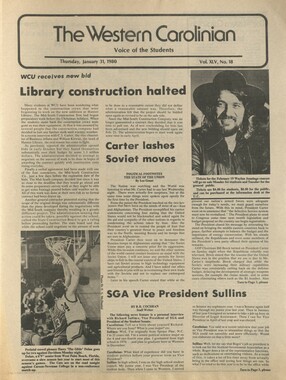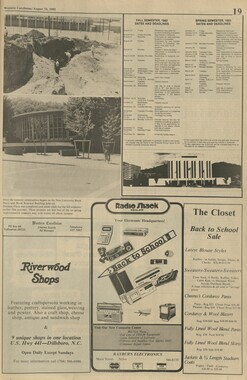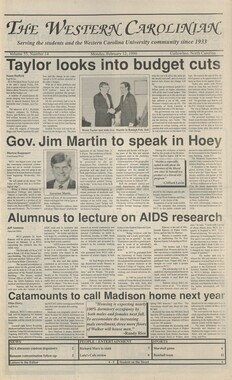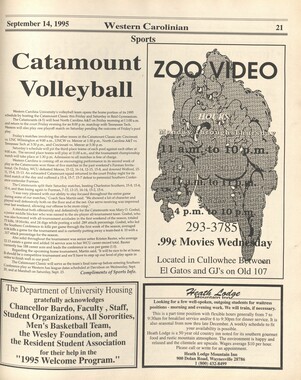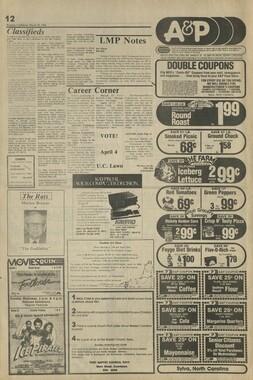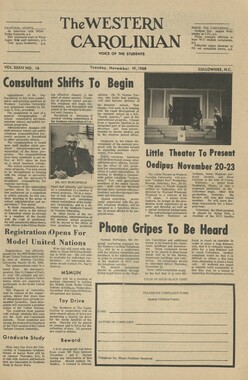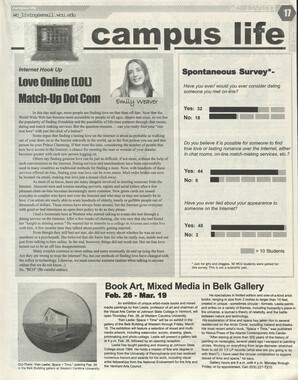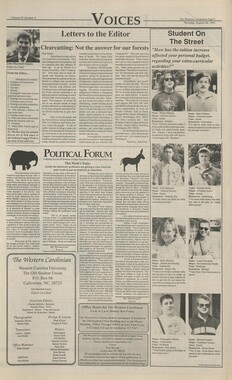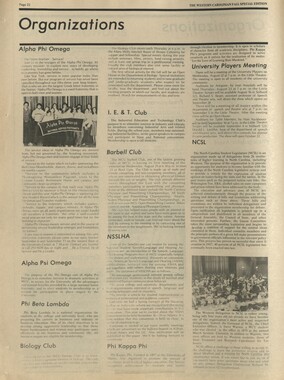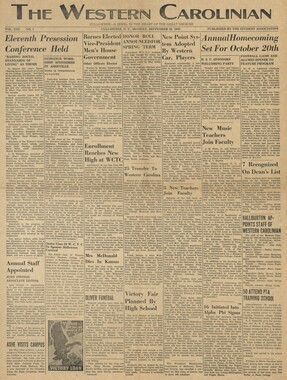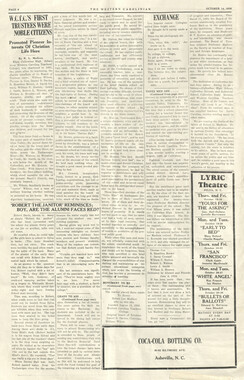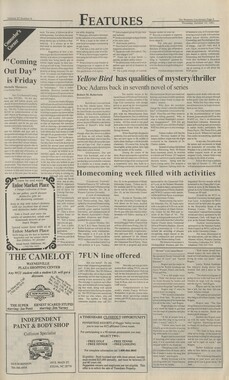Western Carolina University (21)
View all
- Canton Champion Fibre Company (2308)
- Cherokee Traditions (291)
- Civil War in Southern Appalachia (165)
- Craft Revival (1942)
- George Masa Collection (137)
- Great Smoky Mountains - A Park for America (3080)
- Highlights from Western Carolina University (422)
- Horace Kephart (973)
- Journeys Through Jackson (159)
- LGBTQIA+ Archive of Jackson County (89)
- Oral Histories of Western North Carolina (318)
- Picturing Appalachia (6617)
- Stories of Mountain Folk (413)
- Travel Western North Carolina (153)
- Western Carolina University Fine Art Museum Vitreograph Collection (129)
- Western Carolina University Herbarium (92)
- Western Carolina University: Making Memories (738)
- Western Carolina University Publications (2491)
- Western Carolina University Restricted Electronic Theses and Dissertations (146)
- Western North Carolina Regional Maps (71)
- World War II in Southern Appalachia (131)
University of North Carolina Asheville (6)
View all
- Allanstand Cottage Industries (62)
- Appalachian National Park Association (53)
- Bennett, Kelly, 1890-1974 (1463)
- Berry, Walter (76)
- Brasstown Carvers (40)
- Carver, George Washington, 1864?-1943 (26)
- Cathey, Joseph, 1803-1874 (1)
- Champion Fibre Company (233)
- Champion Paper and Fibre Company (297)
- Cherokee Indian Fair Association (16)
- Cherokee Language Program (22)
- Crowe, Amanda (40)
- Edmonston, Thomas Benton, 1842-1907 (7)
- Ensley, A. L. (Abraham Lincoln), 1865-1948 (275)
- Fromer, Irving Rhodes, 1913-1994 (70)
- George Butz (BFS 1907) (46)
- Goodrich, Frances Louisa (120)
- Grant, George Alexander, 1891-1964 (96)
- Heard, Marian Gladys (60)
- Kephart, Calvin, 1883-1969 (15)
- Kephart, Horace, 1862-1931 (313)
- Kephart, Laura, 1862-1954 (67)
- Laney, Gideon Thomas, 1889-1976 (439)
- Masa, George, 1881-1933 (61)
- McElhinney, William Julian, 1896-1953 (44)
- Niggli, Josephina, 1910-1983 (10)
- North Carolina Park Commission (105)
- Osborne, Kezia Stradley (9)
- Owens, Samuel Robert, 1918-1995 (11)
- Penland Weavers and Potters (36)
- Roberts, Vivienne (15)
- Roth, Albert, 1890-1974 (142)
- Schenck, Carl Alwin, 1868-1955 (1)
- Sherrill's Photography Studio (2565)
- Southern Highland Handicraft Guild (127)
- Southern Highlanders, Inc. (71)
- Stalcup, Jesse Bryson (46)
- Stearns, I. K. (213)
- Thompson, James Edward, 1880-1976 (226)
- United States. Indian Arts and Crafts Board (130)
- USFS (683)
- Vance, Zebulon Baird, 1830-1894 (1)
- Weaver, Zebulon, 1872-1948 (58)
- Western Carolina College (230)
- Western Carolina Teachers College (282)
- Western Carolina University (2008)
- Western Carolina University. Mountain Heritage Center (18)
- Whitman, Walt, 1819-1892 (10)
- Wilburn, Hiram Coleman, 1880-1967 (73)
- Williams, Isadora (3)
- Cain, Doreyl Ammons (0)
- Crittenden, Lorraine (0)
- Rhodes, Judy (0)
- Smith, Edward Clark (0)
- Appalachian Region, Southern (3032)
- Asheville (N.C.) (1945)
- Avery County (N.C.) (26)
- Blount County (Tenn.) (195)
- Buncombe County (N.C.) (1680)
- Cherokee County (N.C.) (283)
- Clay County (N.C.) (556)
- Graham County (N.C.) (238)
- Great Smoky Mountains National Park (N.C. and Tenn.) (525)
- Haywood County (N.C.) (3573)
- Henderson County (N.C.) (70)
- Jackson County (N.C.) (4925)
- Knox County (Tenn.) (35)
- Knoxville (Tenn.) (13)
- Lake Santeetlah (N.C.) (10)
- Macon County (N.C.) (421)
- Madison County (N.C.) (216)
- McDowell County (N.C.) (39)
- Mitchell County (N.C.) (135)
- Polk County (N.C.) (35)
- Qualla Boundary (982)
- Rutherford County (N.C.) (78)
- Swain County (N.C.) (2185)
- Transylvania County (N.C.) (270)
- Watauga County (N.C.) (12)
- Waynesville (N.C.) (86)
- Yancey County (N.C.) (72)
- Aerial Photographs (3)
- Aerial Views (60)
- Albums (books) (4)
- Articles (1)
- Artifacts (object Genre) (228)
- Bibliographies (1)
- Biography (general Genre) (2)
- Cards (information Artifacts) (38)
- Clippings (information Artifacts) (192)
- Copybooks (instructional Materials) (3)
- Crafts (art Genres) (622)
- Depictions (visual Works) (21)
- Design Drawings (1)
- Digital Moving Image Formats (2)
- Drawings (visual Works) (185)
- Envelopes (101)
- Exhibitions (events) (1)
- Facsimiles (reproductions) (1)
- Fiction (general Genre) (4)
- Financial Records (12)
- Fliers (printed Matter) (67)
- Glass Plate Negatives (381)
- Guidebooks (2)
- Internegatives (10)
- Interviews (823)
- Land Surveys (102)
- Letters (correspondence) (1045)
- Manuscripts (documents) (618)
- Maps (documents) (177)
- Memorandums (25)
- Minutes (administrative Records) (59)
- Negatives (photographs) (6090)
- Newsletters (1290)
- Newspapers (2)
- Notebooks (8)
- Occupation Currency (1)
- Paintings (visual Works) (1)
- Pen And Ink Drawings (1)
- Periodicals (194)
- Personal Narratives (10)
- Photographs (12977)
- Plans (maps) (1)
- Poetry (6)
- Portraits (4568)
- Postcards (329)
- Programs (documents) (181)
- Publications (documents) (2444)
- Questionnaires (65)
- Relief Prints (26)
- Sayings (literary Genre) (1)
- Scrapbooks (282)
- Sheet Music (2)
- Slides (photographs) (402)
- Songs (musical Compositions) (2)
- Sound Recordings (802)
- Specimens (92)
- Speeches (documents) (18)
- Tintypes (photographs) (8)
- Transcripts (329)
- Text Messages (0)
- A.L. Ensley Collection (275)
- Appalachian Industrial School Records (7)
- Appalachian National Park Association Records (336)
- Axley-Meroney Collection (2)
- Bayard Wootten Photograph Collection (20)
- Bethel Rural Community Organization Collection (7)
- Blumer Collection (5)
- C.W. Slagle Collection (20)
- Canton Area Historical Museum (2110)
- Carlos C. Campbell Collection (462)
- Cataloochee History Project (64)
- Cherokee Studies Collection (4)
- Daisy Dame Photograph Album (5)
- Daniel Boone VI Collection (1)
- Doris Ulmann Photograph Collection (112)
- Elizabeth H. Lasley Collection (1)
- Elizabeth Woolworth Szold Fleharty Collection (4)
- Frank Fry Collection (95)
- George Masa Collection (173)
- Gideon Laney Collection (452)
- Hazel Scarborough Collection (2)
- Hiram C. Wilburn Papers (28)
- Historic Photographs Collection (236)
- Horace Kephart Collection (861)
- Humbard Collection (33)
- Hunter and Weaver Families Collection (1)
- I. D. Blumenthal Collection (4)
- Isadora Williams Collection (4)
- Jesse Bryson Stalcup Collection (47)
- Jim Thompson Collection (224)
- John B. Battle Collection (7)
- John C. Campbell Folk School Records (80)
- John Parris Collection (6)
- Judaculla Rock project (2)
- Kelly Bennett Collection (1482)
- Love Family Papers (11)
- Major Wiley Parris Civil War Letters (3)
- Map Collection (12)
- McFee-Misemer Civil War Letters (34)
- Mountain Heritage Center Collection (4)
- Norburn - Robertson - Thomson Families Collection (44)
- Pauline Hood Collection (7)
- Pre-Guild Collection (2)
- Qualla Arts and Crafts Mutual Collection (12)
- R.A. Romanes Collection (681)
- Rosser H. Taylor Collection (1)
- Samuel Robert Owens Collection (94)
- Sara Madison Collection (144)
- Sherrill Studio Photo Collection (2558)
- Smoky Mountains Hiking Club Collection (616)
- Stories of Mountain Folk - Radio Programs (374)
- The Reporter, Western Carolina University (510)
- Venoy and Elizabeth Reed Collection (16)
- WCU Gender and Sexuality Oral History Project (36)
- WCU Mountain Heritage Center Oral Histories (25)
- WCU Oral History Collection - Mountain People, Mountain Lives (71)
- WCU Students Newspapers Collection (1923)
- Western North Carolina Tomorrow Black Oral History Project (69)
- William Williams Stringfield Collection (2)
- Zebulon Weaver Collection (109)
- African Americans (390)
- Appalachian Trail (35)
- Artisans (521)
- Cherokee art (84)
- Cherokee artists -- North Carolina (10)
- Cherokee language (21)
- Cherokee pottery (101)
- Cherokee women (208)
- Church buildings (190)
- Civilian Conservation Corps (U.S.) (111)
- College student newspapers and periodicals (2012)
- Dams (108)
- Dance (1023)
- Education (222)
- Floods (63)
- Folk music (1015)
- Forced removal, 1813-1903 (2)
- Forest conservation (220)
- Forests and forestry (1198)
- Gender nonconformity (4)
- Great Smoky Mountains National Park (N.C. and Tenn.) (181)
- Hunting (47)
- Landscape photography (25)
- Logging (122)
- Maps (83)
- Mines and mineral resources (9)
- North Carolina -- Maps (18)
- Paper industry (38)
- Postcards (255)
- Pottery (135)
- Railroad trains (72)
- Rural electrification -- North Carolina, Western (3)
- School integration -- Southern States (2)
- Segregation -- North Carolina, Western (5)
- Slavery (5)
- Sports (452)
- Storytelling (243)
- Waterfalls -- Great Smoky Mountains (N.C. and Tenn.) (66)
- Weaving -- Appalachian Region, Southern (280)
- Wood-carving -- Appalachian Region, Southern (328)
- World War, 1939-1945 (173)
Western Carolinian Volume 69 Number 10
Item
Item’s are ‘child’ level descriptions to ‘parent’ objects, (e.g. one page of a whole book).
-
-
ee 16 2newsmagazine by Brandon A. Robinson * WCnewsmagazine What manner of soul do we behold, who, in just thirty-nine years, affected revolution in racial and social paradigmsarticulated by W.E.B. DuBois at the beginning of the twentieth century? Who cherished the constitutional structure of America, even as he challenged it? Who lived for ideas, but also harnessed them to action? The answer to these queries is simplea soul of virtue, of moral forcethe soul of Dr. Martin Luther King, Jr. Born on Jan. 15, 1929, Martin Luther King, Jr. was heir to a family long established among Atlantas black upper-class. Both his father and maternal grandfather were college-educated clergymendistinctions that were to formidably shape the contours of Martins young mind. From his mother, Alberta Williams King, the lad imbibed the charm and grace that would attract countless friends; from his father, Martin, Sr., he learned to be ebullient in defense of his principles. King was a precocious youth; sitting in Ebenezer Baptist Church, listening to his father, the rhythm and power of words came naturally to him. He never ceased admiring orators, and in time would develop that rhapsodic eloquence that stirs human souls. For the time being, he read books, sang in his fathers choir and matriculated at Morehouse College at age fifteen. At Morehouse, King first encountered Henry David Thoreaus essay On Civil Disobedience, which sparked nascent thoughts about nonviolent protest against racial discrimination. It was also in college that King began to deeply question his fundamentalist upbringing: More and more | could see a gap between what | had learned in Sunday school and what | was learning in college. My studies had made me skeptical, and | could not see how many of the facts of science could be squared with religion. He delivered his trial sermon at fifteen, but the inward struggle between his secular and religious thought would propel him into deep, far- reaching studies in history, philosophy, theology and political theory. This remarkable odyssey of the mind began at Crozer Theological Seminary in Chester, Pennsylvania. Commencing what he called a serious intellectual quest for a method to eliminate social evil, Kings mind teemed with fecund ideas. In his own words, I turned to a serious study of the social and ethical theories of the great philosophers, from Plato and Aristotle down to Rousseau, Hobbes, Bentham, Mill and Locke. King believed, despite his previous religious doubts, that Christian love, if understood and appreciated, could help him chart a course of resistance when he returned south. This view would be sorely tested when he read Marx's The Communist Manifesto and Das Kapital during Christmas Break kes and again when he * King lived the life of a Philosopher King personality"History is ultimately guided by spirit, not matter, he wrote. As he neared graduation from Crozer in 1951, King was convinced that in order to guide the spirit of humanity, he must address all of ones existencespiritual, cultural, intellectual, economic, political and social. After Crozer, King enrolled at Boston University for a Doctorate of Philosophy in sociology. Though he continued his study of philosophersadding Kierkegaard, Heidegger and Hegel to his repertoire this stage was somewhat anticlimactic for him. His two most notable achievements were of very opposite kinds: first, he studied personalism as an attempt to reconcile external force to individual worth; second, he met his future wife, Coretta Scott, of Marion, Alabama. An attractive, self- reliant woman, Coretta had graduated from Antioch College and was studying voice at the New England Conservatory of Music. She was the daughter of a well-to-do family and was conversant in social and political topics. It took only one meeting over lunch for King to decide the next step; he immediately proposed marriage, and after several repetitions of the question, Coretta eventually accepted. Kings father, Martin Sr., married them at Corettas Alabama home on June 18, 1953. In mid-1954, still finishing his doctoral thesis for Boston University, King accepted a ministerial position at Dexter Avenue Baptist Church in Montgomery, Alabama. It was a move that would change his life forever: just a year later, a middie- aged woman named Rosa Parks was arrested | and fined for refusing to give up her seat to a white passenger. E.D. Nixon, Montgomery's most noted black activist, immediately galvanized he lic opinion i the boycott would take place. The leaders of the black communityNixon, Ralph Abernathy, Jo Ann Robinson, Rufus West and othersdecided that a young, well-educated and articulate spokesperson was needed to consolidate the movement's energies. They settled upon the twenty-six year old minister, and thus he began his foray into the national spotlight. His nonviolent creedinspired mostly by Thoreau and Ghandiwas tested sooner than expected. While leading the boycott, his house was bombed; his family was unharmed, but the trial by fire was palpable. But, King noted, We came to see that, in the long run, it is more honorable to walk in dignity than ride in humiliation. So in a quiet dignified manner, we decided to substitute tired feet for tired souls, and walk the streets of Montgomery until the swagging walls of injustice had been crushed by the battering rams of surging justice. On Nov. 13, 1956, the U.S. Supreme Court declared all bus segregation laws unconstitutional. Now a national figure, King assumed, in 1957, the presidency of the Southern Christian Leadership Conference. In this capacity he traveled the country, speaking at prayer breakfasts, organizing marches and playing an increasingly pivotal role in presidential politicsparticularly after President Dwight D. Eisenhower used military force to integrate Little Rock Central High School. True to his earlier studies, King refused to fight fire with fire, enduring stoning,
Object
Object’s are ‘parent’ level descriptions to ‘children’ items, (e.g. a book with pages).
-
The Western Carolinian is Western Carolina University's student-run newspaper. The paper was published as the Cullowhee Yodel from 1924 to 1931 before changing its name to The Western Carolinian in 1933.
-
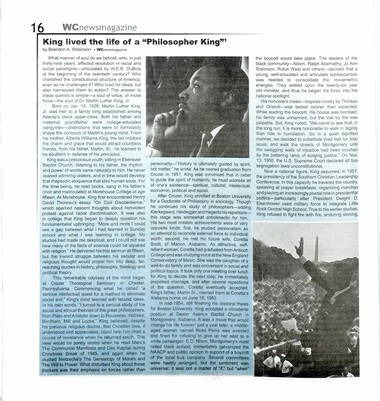

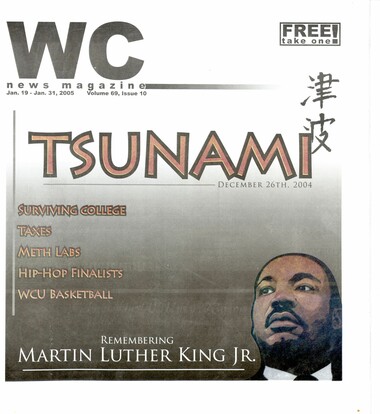
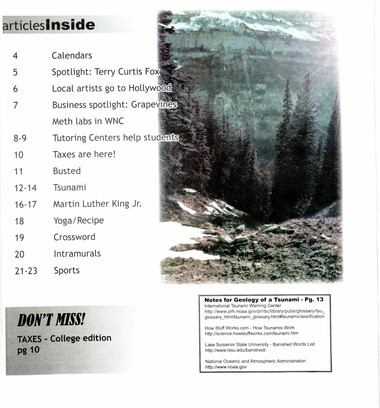
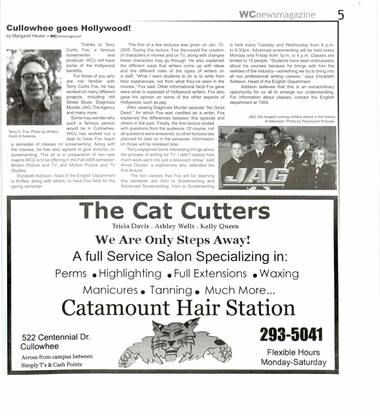

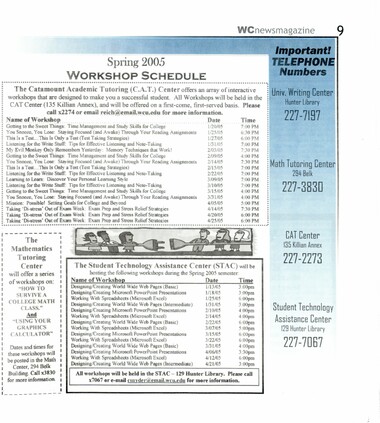
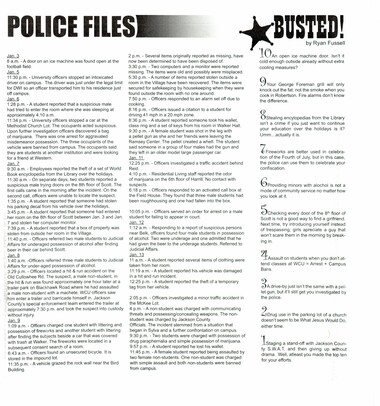
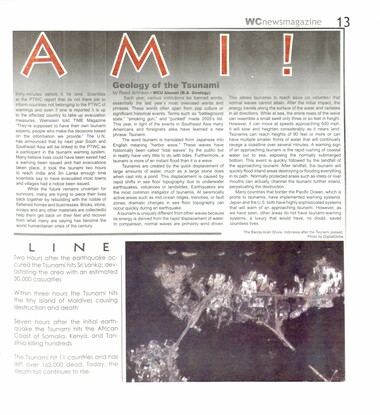
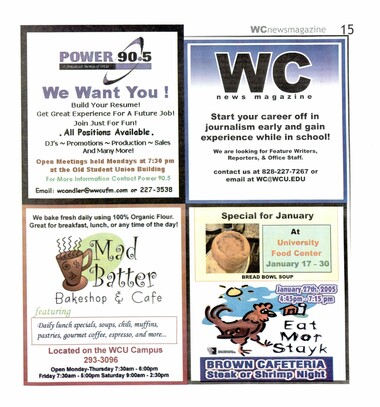


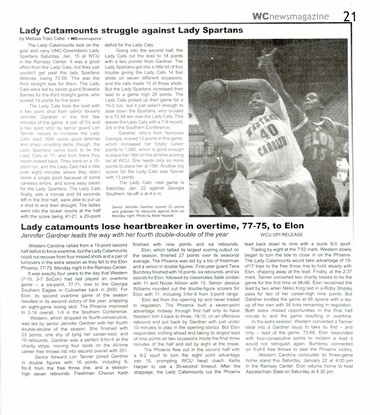
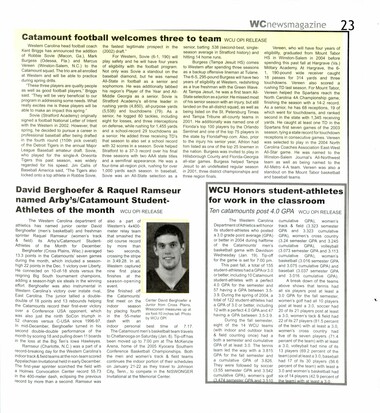
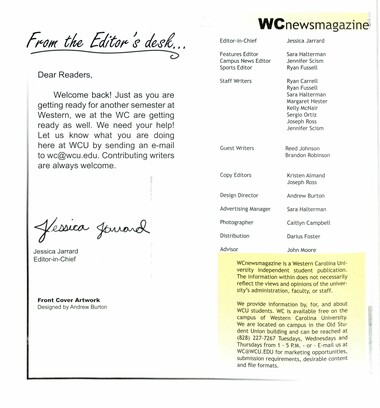
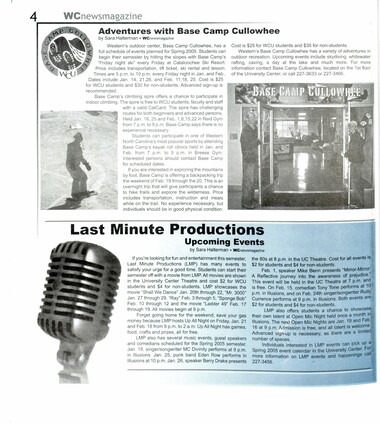
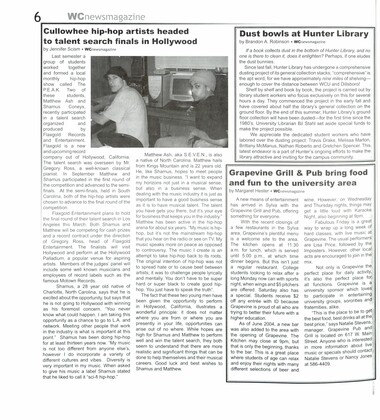
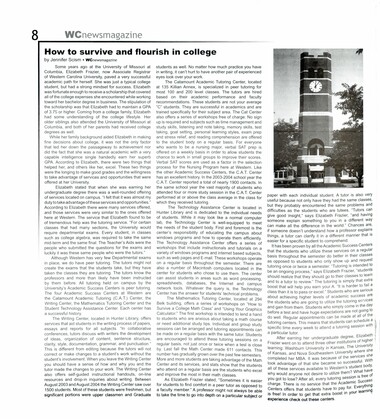
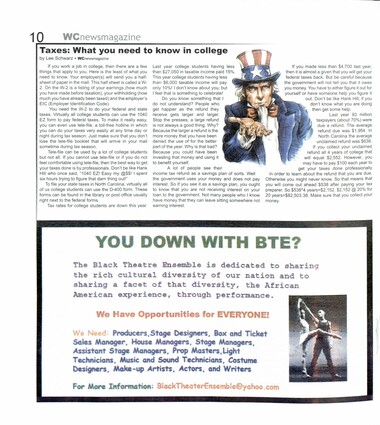
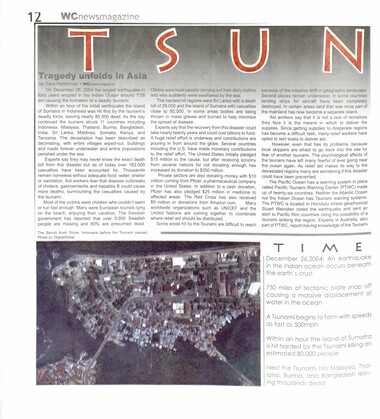
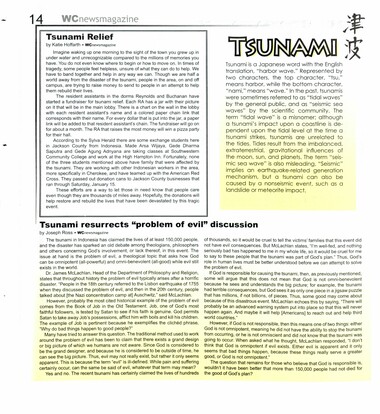
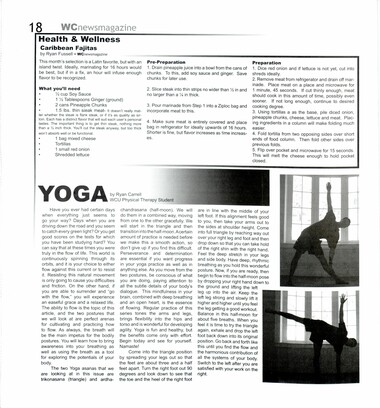

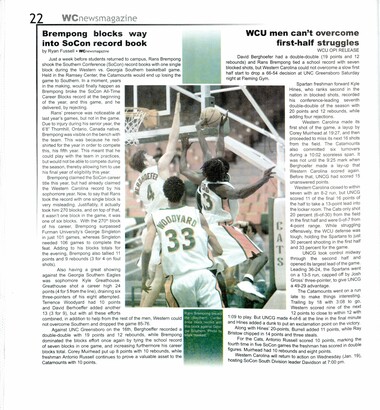
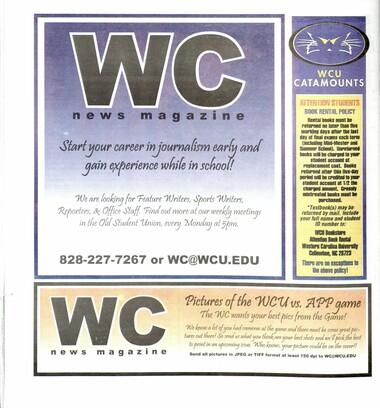
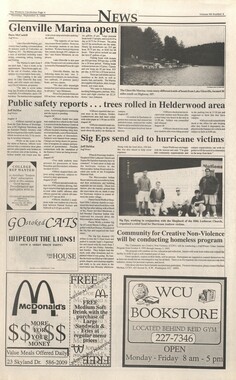
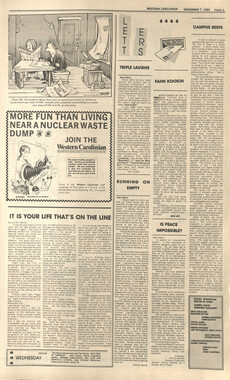
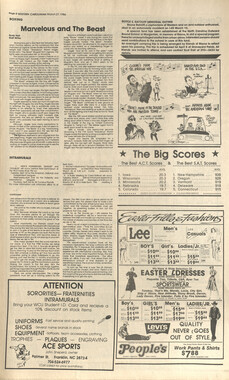
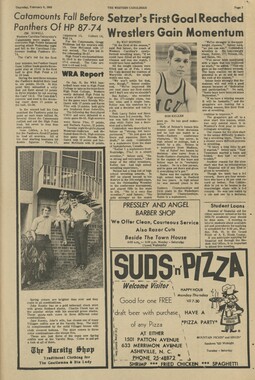
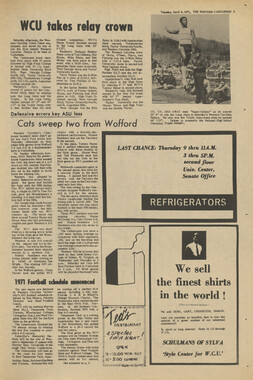

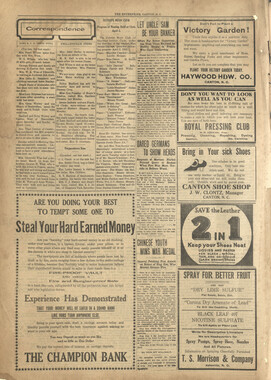
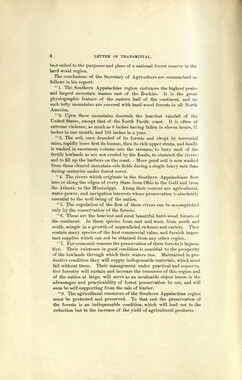
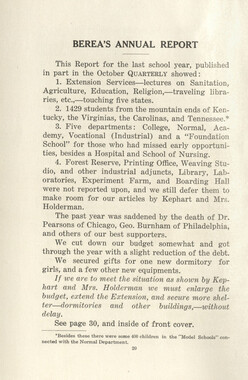
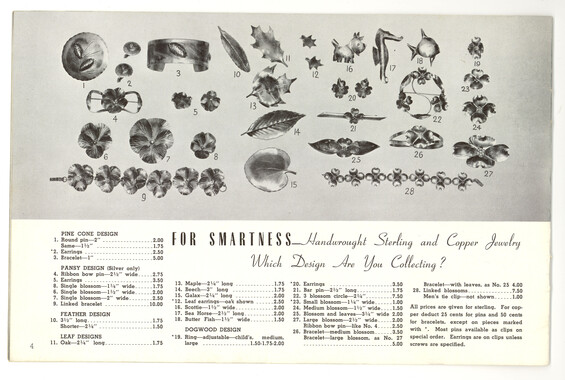
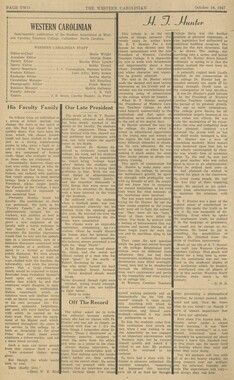
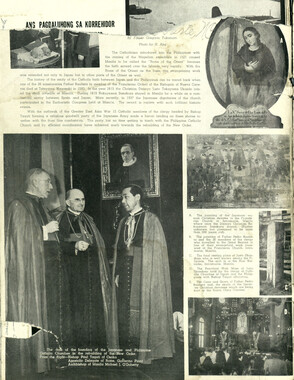

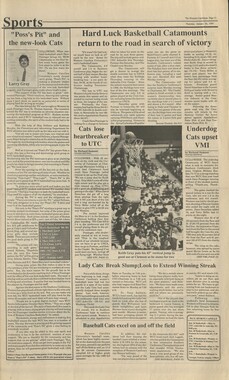
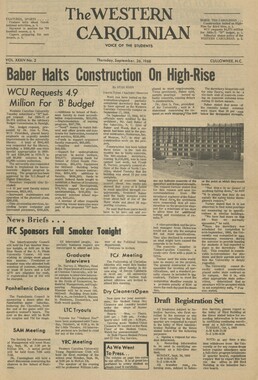
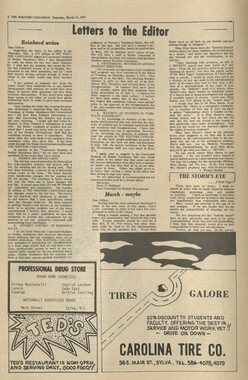


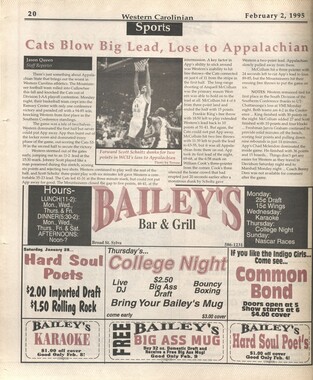
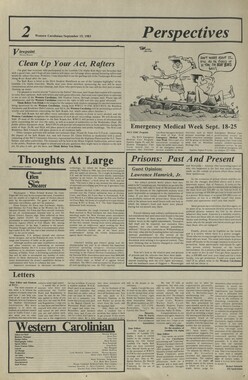
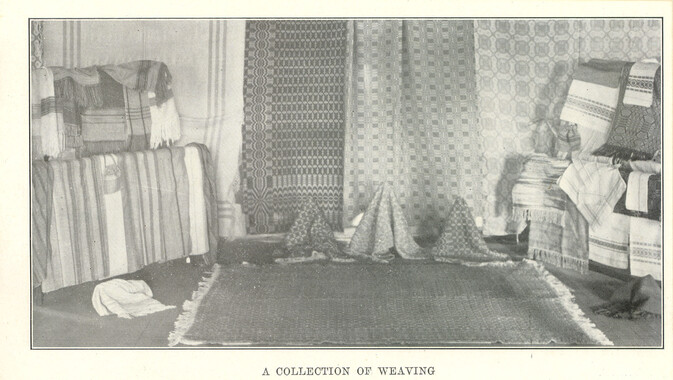
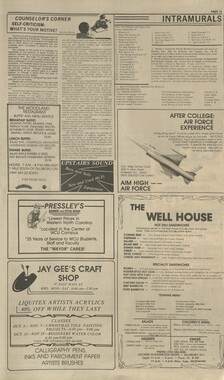
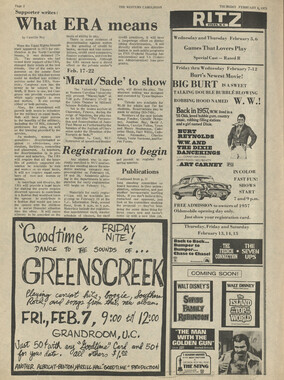
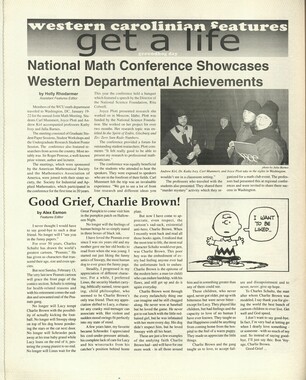
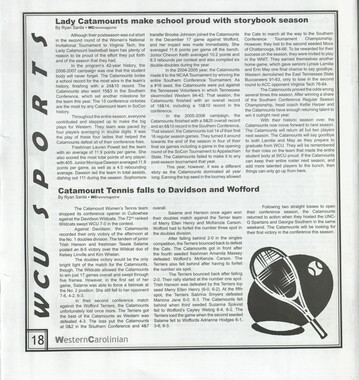

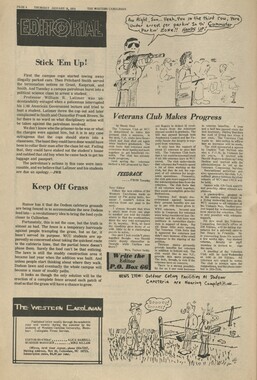
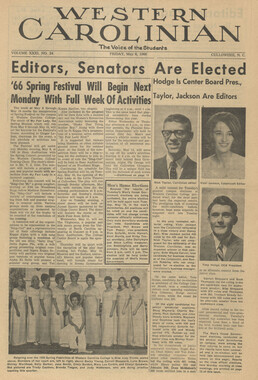
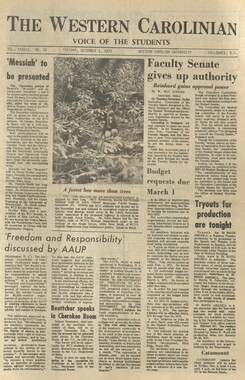
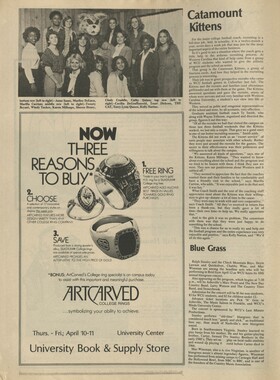
![hl_westerncarolinian_2008-09-26[10-27]_vol74_no03[04]_01.jpg](/media/w400h300/wcu_publications/hl_westerncarolinian_2008-09-26[10-27]_vol74_no03[04]_01.jpg)
